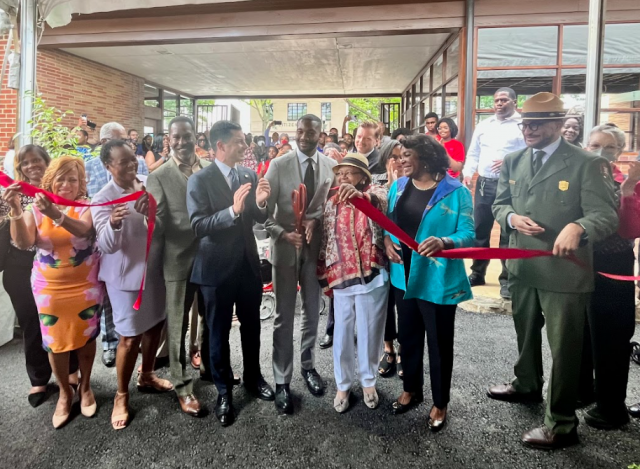
By Ryan Michaels
The Birmingham Times
Birmingham Mayor Randall Woodfin, city leaders and other dignitaries that included U.S. Secretary of Transportation Pete Buttigieg, on Thursday cut the ribbon at the historic A.G. Gaston Motel on 5th Avenue North where substantial completion of a three-year restoration has been completed.
The motel, which was first built by legendary Birmingham businessman Gaston, to provide accommodations for Black guests traveling in the segregated South, served as a significant meeting place for various Civil Rights Movement leaders of the 1960s, like Rev. Fred L. Shuttlesworth and Martin Luther King Jr.
Room 30 in the motel became known as the “War Room,” where Project C – “C” for confrontation, a series of Birmingham sit-ins, marches, and boycotts — was strategized by Shuttlesworth, King, Jr., Wyatt Walker and other Civil Rights leaders. It was in that room where King decided to defy a court injunction and be jailed alongside local protesters — a move that led to his famous “Letter from Birmingham Jail.”
Woodfin said restoration of the historic site is a continuation of the city’s mission to “reflect, restore, renew . . .Those have been our guiding principles as we’ve journeyed to restore what our forefathers, as well as our foremothers, built for us on this hallowed ground we are all seated and standing on right now,” Woodfin said.
U.S. Rep. Terri Sewell, who represents Alabama’s seventh congressional district, said, “the promise of historic preservation is the promise that we know from whence we come and on whose shoulders we stand, but it also is important that we pay it forward.”
The restored motel should be a space that emboldens people in their continuing efforts for justice, Sewell added.
“It’s so important that we not only preserve these sites, but we remember, reflect as the mayor said, but we also come and be renewed in a space like this, renewed and rededicate ourselves to the premise for which they all thought, which is for this country to live up to its highest ideals of equality and justice for all,” Sewell said.
The restored motel will call on people in positions of authority “to examine how we are making ourselves useful to the cause of racial justice and fairness and equity,” Buttigieg said.
“Some would rather ignore our past than come to terms with it in the service of a better future, as if divisions from the past that we live with today could be wished away by just not talking about them, not acknowledging them, but of course, the promise of our future depends on our relationship to the past,” he said.
Lance Hatten, acting National Parks Service (NPS) director for the Southeast, said the motel housed those of intense courage during the Civil Rights Movement.
“Where we stand is hallowed ground, made so by the suffering and the courage of Birmingham residents, that in 1963, gathered here to challenge racial segregation. I am inspired by the example of their bravery and disturbed by the ferocious violence used to suppress them,” Hatten said.
The A.G. Gaston Motel is part of the Birmingham Civil Rights National Monument, a collaborative partnership of the NPS, the city of Birmingham and the Historical Preservation Authority, which encompasses four blocks downtown and includes 16th Street Baptist Church, Kelly Ingram Park, St. Paul United Methodist Church and Bethel Baptist Church in the Collegeville neighborhood.
“What happened at these places propelled human and civil rights to the forefront of the American conscience. What happened here is more than history. It represents a national sacrifice for the cause of equality. It is the lived experience of Birmingham residents,” Hatten said.




